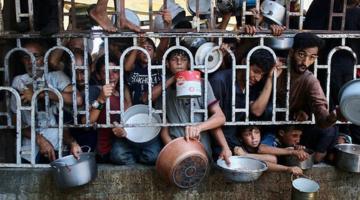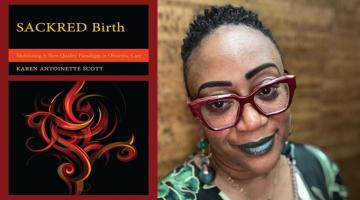A world of reproductive justice must so be rooted in respect, care and a willingness to challenge all of the practices and beliefs that place people in hierarchical relations.
“Black women’s reproduction sits at the intersection of medical control and racism.”
In this series, we ask acclaimed authors to answer five questions about their book. This week’s featured author is Dana-Ain Davis. Davis is Director of the Center for the Study of Women and Society at the Graduate Center, CUNY (New York). Her book is Reproductive Injustice: Racism, Pregnancy, and Premature Birth.
Roberto Sirvent: How can your book help BAR readers understand the current political and social climate?
Dana-Ain Davis: My book, Reproductive Injustice: Racism, Pregnancy and Premature Birth, explores the historically constituted precedents that have influenced Black women’s relationship with the medical system and medical providers. I interviewed women, most of whom were Black, partners, ob/gyn’s, neonatologists, labor and delivery nurses, NICU nurses, midwives, doulas, reproductive justice advocates, and March of Dimes administrators. Many of the Black women interviewed described the tensions in their relationships with medical providers around their pregnancies, labors, births, and post-partum. The current climate of reproductive politics is one in which people’s reproductive autonomy is being eroded. In addition to the erosion of reproductive access, there is the issue of how Black women’s reproduction sits at the intersection of medical control and racism.
I hope that the book sheds light on this particular political moment that is lifting up Black women’s experiences of and racism in their reproductive lives, specifically during pregnancy, labor, birth and postpartum. I also hope that the experiences some Black birthing people have with the medical system is understood as the primary reason that so many are organizing—doulas, midwives, nurses, and reproductive justice advocates.
What do you hope activists and community organizers will take away from reading your book?
The book lays out the meaning that Black women give to the encounters they have with medical providers. I hope that through sharing Black women’s narratives, people recognize the importance of narratives to tell the affective story of medical encounters. I hope that activists and community organizers are able to draw from these narratives to shape the kind of responses and care that birthing people desire and that they can be used to illuminate what I’m calling “obstetric racism” looks like. But illumination is not the end goal. People's narratives can lead to solutions or at least suggestions. So, I hope that the book allows activists to push for “radical caring” on the part of the medical community. That is not just the provision of medical services, but care rooted in how people want to be treated: with integrity, as intelligent, and with compassion.
One of the hopes I have is that the book will reveal the incredible importance and impact of birth workers, who have truly taken up the mantle of addressing Black and other birthing people’s adverse experiences and birth outcomes.
We know readers will learn a lot from your book, but what do you hope readers will un-learn? In other words, is there a particular ideology you’re hoping to dismantle?
Actually, I think most people when they think of Black women’s adverse birth outcomes, assume those birth outcomes are the result of impoverishment, people’s bad behavior, or their unwillingness to follow direct orders from their medical providers. I am hoping that the book reveals that people across the class spectrum, across the educational spectrum, have similar kinds of adverse birth outcomes and medical encounters.
I want readers to unlearn the way society has pigeonholed poor and low-income people as being responsible for their own health/birth outcomes. I also want readers to unlearn how we place the medical industry on a pedestal such that we think pregnancy must be medicalized at the expense of having a more expansive view of pregnancy and birthing. When I say that, I am not suggesting that there is no place for medicine. But I am saying that we most certainly should have access to more birthing options, including homebirths and birthing centers. Assuming no complications, there should be the same reimbursement rate for a midwife-attended homebirth as a hospital birth.
If members of the medical profession read the book, I hope they unlearn that and that clinical expertise they have must be mediated by the expertise that people have about their own bodies. And even if the person is not right about their self-diagnosis, it does not mean that don’t deserve to heard and talked to with care.
Who are the intellectual heroes that inspire your work?
I am absolutely inspired by Black women…in all our complexity. I am inspired by feminist theorists of our everyday lives and struggles including Audre Lorde, Toni Morrison, Gloria Anzaldúa, Cherríe Moraga. I am inspired by poets like Ai, June Jordan, Ntozake Shange and Nikki Giovanni.
The truth is that my intellectual genealogy also consists of musicians like Toshi Reagon, Concha Buika, Bobbi Humphrey, and Chavela, artists, like Kara Walker, Mickalene Thomas, Simone Leigh, Kehinde Wiley and photographers like Gordon Parks and Carrie Mae Weems. Artists allow me to think through concepts and people's experiences in different ways; dancers and musicians influence how I think about the world in terms of both challenges and possibilities.
But my academic genealogy began with Leith Mullings and Beth Richie. Eugenia Acuña, Toni Bond, Laura Briggs, Monica Casper, Deirdre Cooper Owens, Annie Menzel, Jennifer Morgan, Sameena Mulla, Rosalind Petchesky, Rayna Rapp, Dorothy E. Roberts and Lynn Roberts have been extremely important in my thinking about medical anthropology, science and technology studies, race, and reproduction. I have had the honor of working and/or thinking with all of these people and it has been mind-blowing. And then there are scholars, like Aimee Cox, Vanessa Agard-Jones, Savannah Shange, and Whitney Richards-Calathes whose thinking and writing are breathtaking. I am sure I am forgetting people, because there are so many who have helped to build my intellectual pantheon and influenced both my thinking and my political commitments.
In what way does your book help us imagine new worlds?
I actually wish that I had written more about how we could imagine a new world. Nonetheless, I do think the book travels through a kind of path that is painful and then it leads us to one type of solution. The solution I believe offered in reading the book really recognizes the importance of what I call radical birth workers. Most of the radical birth workers I spent time with were Black; they were doulas, midwives, and reproductive justice advocates. And since what we need is a more caring vision and practice so that birthing people can have the kind of justice they deserve, then the people I spent time with whose beliefs and experiences are chronicled in the book, are the ones who can really help us imagine a new world.
A world of reproductive justice must so be rooted in respect, care and a willingness to challenge all of the practices and beliefs that place people in hierarchical relations. I imagine that we can collectively create a community that ushers in radical care and that we can imagine what caring for birthing and non-birthing people looks like that is built on justice, and I hope that justice translates into other domains of people’s lives, like housing justice, food justice, all kinds of justice. Because reproductive justice imagines BIG, we imagine big changes, not just around reproduction. It’s not just only just about reproduction…it is about justice.
Roberto Sirvent is Professor of Political and Social Ethics at Hope International University in Fullerton, CA. He also serves as the Outreach and Mentoring Coordinator for the Political Theology Network. He is co-author, with fellow BAR contributor Danny Haiphong, of the new book, American Exceptionalism and American Innocence: A People’s History of Fake News—From the Revolutionary War to the War on Terror.
COMMENTS?
Please join the conversation on Black Agenda Report's Facebook page at http://facebook.com/blackagendareport
Or, you can comment by emailing us at comments@blackagendareport.com



















